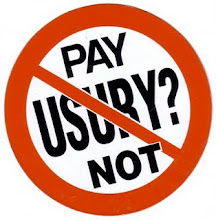And you know what?
Caruana is certainly correct to be warning us about these things.
As I have written about
previously, the total amount of government debt in the world has grown
by about 40 percent since the last recession, and the "too big to fail banks" have collectively gotten
37 percent larger since that time.
The massive financial imbalances that we were facing during the last crisis have not been fixed. Instead, they have gotten much, much worse.
But should we trust the Bank for International Settlements?
Of course not.
An immensely powerful international organization that most people have never even heard of secretly controls the money supply of the entire globe. It is called the Bank for International Settlements, and it is the central bank of central banks. It is located in Basel, Switzerland, but it also has branches in Hong Kong and Mexico City. It is essentially an unelected, unaccountable central bank of the world that has complete immunity from taxation and from national laws. Even Wikipedia admits that "
it is not accountable to any single national government." The Bank for International Settlements was used to launder money for the Nazis during World War II, but these days the main purpose of the BIS is to guide and direct the centrally-planned global financial system. Today, 58 global central banks belong to the BIS, and it has far more power over how the U.S. economy (or any other economy for that matter) will perform over the course of the next year than any politician does. Every two months, the central bankers of the world gather in Basel for another "Global Economy Meeting". During those meetings, decisions are made which affect every man, woman and child on the planet, and yet none of us have any say in what goes on. The Bank for International Settlements is an organization that was founded by the global elite and it operates for the benefit of the global elite, and it is intended to be one of the key cornerstones of the emerging one world economic system.
The role that the Bank for International Settlements is playing today was envisioned by the global elite long ago. In
another previous article, I quoted from a book that Georgetown University history professor Carroll Quigley wrote in 1975 entitled "Tragedy & Hope" in which he discussed how the BIS was to one day become "the apex" of the global financial system...
[T]he powers of financial capitalism had another far-reaching aim, nothing less than to create a world system of financial control in private hands able to dominate the political system of each country and the economy of the world as a whole. This system was to be controlled in a feudalist fashion by the central banks of the world acting in concert, by secret agreements arrived at in frequent private meetings and conferences. The apex of the system was to be the Bank for International Settlements in Basle, Switzerland, a private bank owned and controlled by the world’s central banks which were themselves private corporations.
And it is interesting to note that Professor Quigley was not against the system that the elite were setting up. He was just an academic that was trying to accurately convey what he had learned about how the global system works.
Sadly, the system that Quigley wrote about all the way back in 1975 has fully blossomed today.
Every two months, the central bankers of the world travel to Switzerland for "Global Economy Meetings" in Basel. Most people have never heard of them, but these Global Economy Meetings were actually discussed
in the Wall Street Journal...
Every two months, more than a dozen bankers meet here on Sunday evenings to talk and dine on the 18th floor of a cylindrical building looking out on the Rhine.
The dinner discussions on money and economics are more than academic. At the table are the chiefs of the world's biggest central banks, representing countries that annually produce more than $51 trillion of gross domestic product, three-quarters of the world's economic output.
So how do you feel about the fact that the central bankers of the world regularly gather to plot their next moves for the global economy?
Should an unelected group of central bankers that has no accountability to any national government really have so much power?
NOTE: This article is originally published at this website:



0 Comments:
Post a Comment
<< Home